Narendra Damodardas Modi who is the 14th and current Prime Minister of India since 2014, is celebrating his 70th birthday today.
He became the first prime minister outside of the Indian National Congress to win two consecutive terms with a full majority and the second to complete more than five years in office after Atal Bihari Vajpayee.
Modi was born to a middle class Gujarati family in Vadnagar. In order to help his father he worked as a tea seller in his childhood. Later he ran his own tea stall.
At the age of eight, Modi was introduced to the Rashtriya Swayamsevak Sangh (RSS), beginning a long association with the organisation.
After finishing high-school in part due to child marriage to Jashodaben Chimanlal Modi, he left his home.
Modi abandoned his marriage publicly. However, after many decades, he acknowledged it.
As per the reports, before returning to Gujarat, Modi travelled around India for two years and visited a number of religious centres. He became a full-time worker of RSS in 1971.
In 1975, during the state of emergency across the country, Modi was forced to go into hiding. In 1985, Modi was assigned to the RSS and he held several positions within the party hierarchy until 2001, rising to the rank of general secretary.
Further, in 2001, Modi was appointed Chief Minister of Gujarat due to Keshubhai Patel’s failing health and poor public image following the earthquake in Bhuj. Soon after, Modi was elected to the legislative assembly. His administration has been considered collusion in the 2002 Gujarat riots or otherwise criticised for its handling of it.
Later, an Investigation Team had been appointed by Supreme Court but didn’t find any evidence to initiate prosecution proceedings against Modi personally. His policies as chief minister, credited with encouraging economic growth, have received praise.
In 2014, Modi led the BJP general election which gave the party a majority in the Indian lower house of parliament, the Lok Sabha, the first time for any single party since 1984.
As the Prime Minister, he began a historic high-profile sanitation campaign, initiated a controversial demonetisation of high-denomination banknotes and weakened or abolished environmental and labour laws.
Modi’s administration revoked the special status of Jammu and Kashmir and also introduced the Citizenship Amendment Act, which resulted in extensive protests across the country. Described as engineering a political realignment towards right-wing politics, Modi remains a figure of controversy domestically and internationally over his Hindu nationalist beliefs and his alleged role during the 2002 Gujarat riots, cited as evidence of an exclusionary social agenda.
Modi has been seen as an inspiration to youth. On his birthday social media trends with a specific quote which says, “First political leader who made the youth of this country take interest in politics.”





